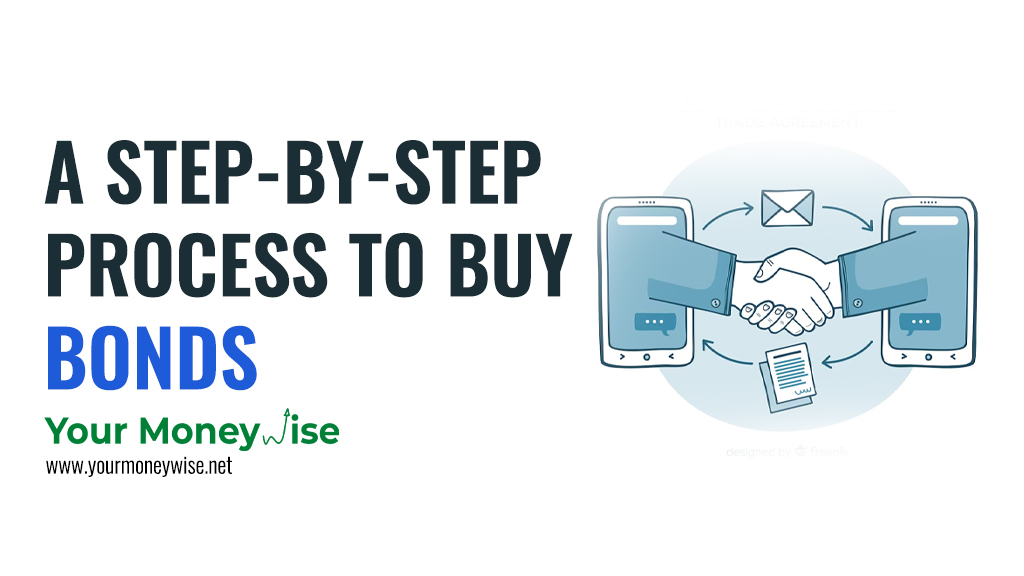Bond investing is a wise and profitable financial move that provides investors with stability and consistent returns. It's critical to comprehend the step-by-step procedure for purchasing bonds whether you're an experienced investor or a beginner trying to diversify your portfolio. The US bond market is huge and provides a wide selection of options for investors looking for fixed-income instruments. This in-depth manual will take you step-by-step through the bond purchasing process while offering helpful advice and information you can use right away.
How To Buy Bonds
The process of buying bonds involves eight major steps, discussed below:
Define Your Investment Goals and Risk Tolerance:
Setting your financial goals and knowing your risk tolerance is essential before entering the bond market. Choose between income production, capital preservation, or a combination of the two. As different types of bonds involve differing levels of risk and return potential, consider your willingness to take on risk.
Research Bond Types:
The US bond market offers a wide variety of bond kinds, including Treasury Inflation-Protected Securities (TIPS), corporate bonds, municipal bonds, and government bonds. Each bond kind has unique characteristics, advantages, and risks. Conduct in-depth research to comprehend the traits and results of each type, matching them to your investing objectives and risk appetite.
Evaluate Bond Ratings and Creditworthiness:
Bond ratings are essential in determining how creditworthy bond issuers are. Ratings are given by rating organizations like Moody's, Standard & Poor's, and Fitch based on an issuer's capacity to pay back its debt. Bonds with higher ratings typically have lower yields but are thought to be safer investments. To determine the degree of risk involved, check the credit ratings of the bonds you are contemplating.
Select a Brokerage or Financial Institution:
You must work with a brokerage or other financial organization that provides bond trading services if you want to purchase bonds. Look into trustworthy brokerage companies or financial organizations that offer access to a variety of bonds at reasonable prices. Take into account aspects like costs, customer support, research tools, and the platform's usability.
Open a Bond Trading Account:
Open a bond trading account once you've decided on a brokerage. Give the required documentation and financial details to finish the account setting process. Review and comprehend the account's terms and conditions, including any fees or minimum investment requirements that may be necessary.
Research and Choose Your Bonds:
Investigate the bonds that are offered using the tools and resources for study that your brokerage has supplied. Consider conducting an analysis of elements including bond yields, maturity dates, coupon rates, and call features. Analyze the issuer's financial standing, market prospects, and any macroeconomic variables that may have an effect on the bond's performance.
Place Your Order:
After careful examination, use the trading platform at your brokerage to make your bond order. Indicate the type of bond, the number of bonds, and the price you are willing to pay. Depending on the execution approach you like, you may be able to place market orders, limit orders, or stop orders.
Monitor Your Portfolio:
Monitor your bond portfolio on a frequent basis after you've finished buying bonds to stay up to date on any changes to the market, interest rates, or credit ratings. Check to see if the bonds are still in line with your investing goals and alter as necessary.
How to Buy Government Bonds?
For investors willing to multiply their wealth and generate a stable income, government bonds provide a safe and reliable shelter for their money. It's always important to understand the procedure if you're also interested in purchasing government bonds. First, establish your investment objectives and risk tolerance. Do you want to preserve your capital or earn money? Then, you should surely do some study on the government securities that are offered in your nation, such as Treasury bonds, Treasury notes, or Treasury bills. Majorly learn about their characteristics, functioning, and conditions, including maturities and interest rates. Once you've chosen the right kind of government bond you wish to buy, think about your desired purchasing plans. Government bonds are purchased from the government directly, through a brokerage, or online.
Open a brokerage account and go over the terms and conditions if that's the route you want to take. Obtain as much as possible information about impending bond offers or auctions from reputable government websites or the financial press. When you're completely ready, place your order using the appropriate method, whether it's placing a bid in an auction or using your brokerage to carry out the transaction. Keep track of your assets and keep an eye out for any changes in interest rates or bond prices after purchasing government bonds.
To make wise and beneficial decisions, always keep in mind to examine your investing strategy and to get professional assistance as necessary.
Investors looking for security and income can find refuge in American government bonds like the widely known U.S. Treasury bonds. Let's look at an illustration of how to purchase government bonds in the United States. The first step should be to get knowledge of all different kinds of treasury bonds that are being offered, such as Treasury notes or Treasury bills, each of these is different in terms of their interest rate and maturity date. Open an account with a brokerage or other financial organization that generally deals in government bonds. Stay updated about treasury bond options by visiting the official website of the government. During the auction, place your bid, or use your brokerage to place your order. To make sure your investing strategy continues to be in line with your objectives, Always keep an eye on your bond holdings and any government revisions.
What to Watch for When You Buy Bonds?
There are a few important things to look out for when purchasing bonds in order to make a profitable purchase. Here are some crucial factors to remember:
1. Available Interest Rates: Always pay attention to the current interest rates offered by the market. Bond prices generally decline as interest rates rise and vice versa because of the inversely proportional relationship between bond prices and yields. Knowing the values of the interest rate helps you to make informed decisions about when to buy bonds.
2. Bond Ratings: In order to make the right decision pay attention to the credit evaluations given to bonds by trusted rating agencies like Moody's, Standard & Poor's, and Fitch. Higher-rated bonds are always considered to be less risky, but lower-rated bonds have a higher risk of default. Take into account the risks involved when assessing the creditworthiness of the bond issuer.
3. Maturity Dates: Try to examine the respective bond maturities you are considering. Short-term bonds mature in 1-3 years, while long-term bonds might have maturities of ten years or longer. S9 try to choose bonds with maturities that meet your goals.
4. Yields: The total return you expect from a bond, including coupon payments and price increases is called bond yield. By comparing the yields of different bonds to assess their potential returns, you can choose bonds that will assist you in achieving your income goals.
5. Call Features: Bonds with call features give the issuer the advantage to collect the bond before its maturity date. Since it affects the timeline and potential returns on your investment, this information is highly crucial and investors should know about this
6. Diversification: Diversification is helpful as it lowers the risk by spreading out your investments and avoiding overexposure to any one bond or issuer. Think about distributing your bond assets over a variety of issuers, sectors, and maturities.
7. Transaction costs: Try to be aware of any costs associated with transactions and the whole process, such as brokerage fees or commissions, that may be incurred when buying bonds. Because these costs have a slight impact on your entire income, you should consider the fees and choose a platform or service that is reasonable.
8. Market Situation: Keep abreast of news, economic information, and market changes that could impact bond prices and yields. Watch out for variables like inflation rates, monetary policy, and world events that may have an impact on the bond market.
You can maximize your investment portfolio and choose wisely when purchasing bonds by paying close attention to these aspects and doing extensive study. You should also see a financial consultant to ensure that your bond investments are in line with your financial objectives and risk tolerance.
Where To Buy Bonds?
There are numerous ways to purchase bonds. Here are a few typical choices:
1. TreasuryDirect: Through their online platform known as TreasuryDirect (www.treasurydirect.gov), the U.S. Department of the Treasury allows you to purchase U.S. government bonds such as Treasury bonds, notes, or bills directly from them. Individual investors can directly buy, manage, and redeem Treasury securities using this platform.
2. Brokerage Companies: The majority of brokerage companies provide bond trading services, giving customers access to a variety of bonds. Bonds can be purchased through a brokerage company's trading platform by opening an account with them. Consider elements including costs, services, customer support, and accessible bond offers when selecting a trustworthy brokerage that meets your needs.
3. Banks and Financial Institutions: A lot of banks and financial institutions also provide services for trading bonds. To learn more about the bond offers and the procedure for purchasing bonds through their platforms, speak with your bank or financial advisor. Based on your investing objectives, they can offer advice and help you choose the right bonds.
4. Online bond marketplaces: These platforms have become popular for buying and selling bonds since they are convenient. These online markets, which offer a large selection of bonds from numerous issuers, link buyers and sellers. Tradeweb, BondDesk, and Interactive Brokers are some illustrative examples of online bond marketplaces.
5. Public Offerings and Auctions: Public offerings and auctions are frequently used to issue government bonds, particularly Treasury securities. Visit the official websites of governmental organizations, such as the U.S. Department of the Treasury, to stay updated about upcoming bond auctions. Investors can place competing bids for bonds at auctions, and winning bidders receive the bonds at the agreed-upon yield.
When choosing where to buy bonds, it's crucial to carry out thorough research, evaluate your options, and take into account a number of variables like fees, available bonds, and the platform's or institution's reputation. In addition to offering helpful advice, consulting with a financial advisor can help you choose the best route for your investment requirements.
Frequently Asked Questions
If you are interested in buying foreign bonds, then you need to consult a brokerage or financial institution that provides services for international bond trading in order to purchase foreign bonds. Brokerage provides access to global bond markets and assists investors in navigating the difficult path of investing in international bonds. Always try to study your options, be aware of the risks, and get guidance from a financial professional. Consider options including currency exchange rates, geopolitical conditions, and any tax repercussions before making a crucial investment.
If you are interested in buying savings bonds for a child then you can use the TreasuryDirect platform in the U.S. Department on the Treasury's official website. The first thing that you have to do is to create a new account in the minors name in which the guardian would be listed as minor account holder. Make the required amount, designate the child as the beneficiary, and adhere to the instructions for buying savings bonds. The most important thing is that you should be mindful of the constraints and limitations imposed on buying savings bonds for minors.









